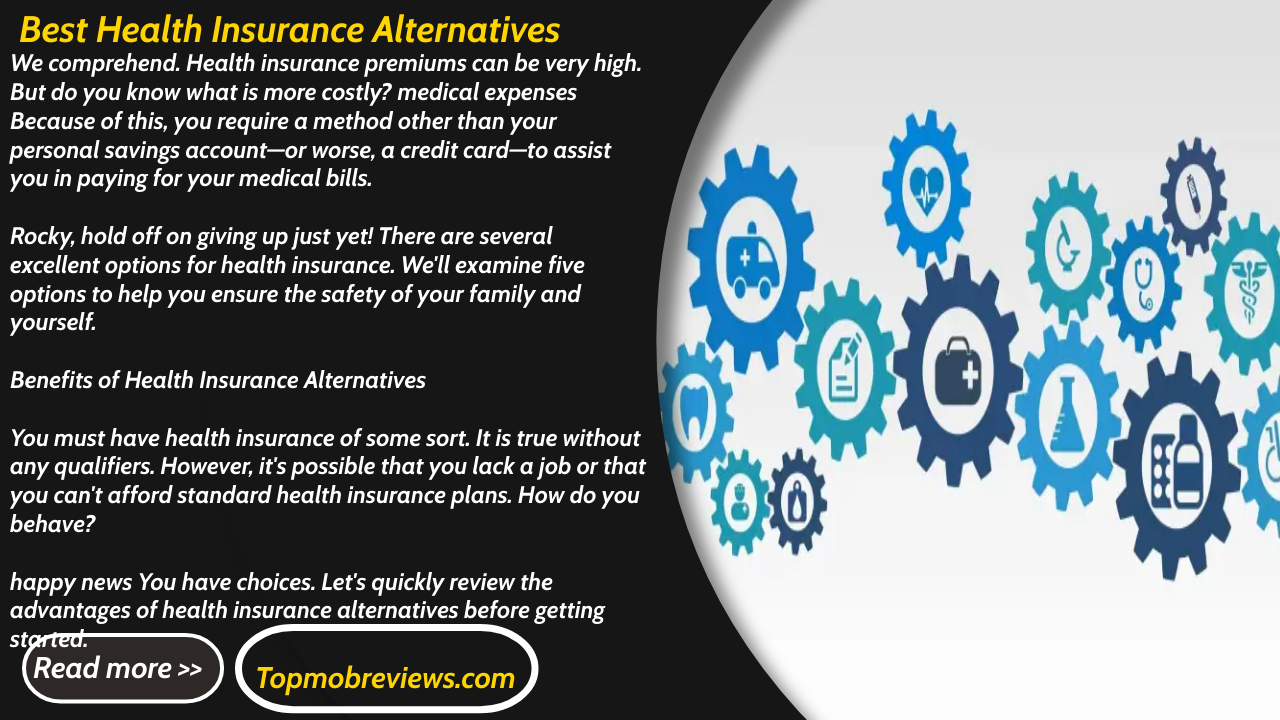Best Health Insurance Alternatives
We comprehend. Health insurance premiums can be very high. But do you know what is more costly? medical expenses Because of this, you require a method other than your personal savings account—or worse, a credit card—to assist you in paying for your medical bills.
Rocky, hold off on giving up just yet! There are several excellent options for health insurance. We’ll examine five options to help you ensure the safety of your family and yourself.
Benefits of Health Insurance Alternatives
You must have health insurance of some sort. It is true without any qualifiers. However, it’s possible that you lack a job or that you can’t afford standard health insurance plans. How do you behave?
happy news You have choices. Let’s quickly review the advantages of health insurance alternatives before getting started.
Saving money: Compared to your employer’s plan or plans available through the federal marketplace, some health insurance solutions may be less expensive.
Plan customization: Using alternatives frequently enables you to customize your strategy to your unique requirements.
Choosing a doctor: Some options provide you with more freedom to choose a physician. Who wouldn’t want that, too?
Let’s examine the first choice right away.
1. Primary Care Memberships
Primary care memberships are similar to gym memberships for medical treatment (also known as concierge medicine or retainer medicine). An independent primary care physician or a medical practice agrees to handle some of your medical requirements in exchange for a monthly fee from you.
Having a primary care membership can be beneficial if you only require essential medical care. There is no co-pay as you already pay a monthly charge. Additionally, you will have a choice of primary care physician and virtually unlimited visits.
The standard services that are covered are listed below:
- Pediatric care
- Nearly unlimited visits to the doctor
- Blood tests and lab work
- Savings on prescriptions
The drawbacks? Memberships in primary care practices are useless if you require surgery, hospitalization, or a specialist. This is why some people opt for both a high-deductible, low-premium health plan and primary care memberships. They are not regulated like conventional policies are since they are not thought of as insurance. It follows that what is covered by one membership might not be covered by another. Therefore, before continuing down this path, just conduct your study.
2. Discount Cards
We’ll be open and truthful. Discount cards sometimes have a bad reputation (like fake Rolex sketchy). Some, though, are the actual deal. In either case, you should never rely only on them for medical coverage.
Here is how they function. With discount cards, you can get substantial discounts (sometimes up to 80%) on things like prescription drugs, dental work, and chiropractic adjustments. However, primary care services like doctor visits are not covered by them.
As we previously stated, not all discount card schemes are as beneficial as they might appear to be (kind of like that get-rich-quick scheme your uncle told you about). In fact, some of them are obvious hoaxes, according to the U.S. Federal Trade Commission. 1
If you’re interested in a discount card, look into reputable providers (such as GoodRx, ScriptSave WellRx, or AARP’s relationship with OptumRx). You already have some form of fundamental health insurance.
Prescriptions are not covered by your plan until your deductible has been met.
Additionally, consider the advantages of a Health Savings Account if you’re seeking other methods to reduce the cost of your health insurance (HSA).
3. Indemnity Insurance
Indemnity insurance is yet another option for health coverage. In essence, indemnity serves to partially cover the cost of medical care. For instance, indemnity insurance will pay you $50 for each appointment if you see a doctor four times a year. Even while you’ll still be responsible for paying for your own treatment, at least you’ll have some assistance with the costs.
Indemnity insurance shouldn’t be your primary source of health insurance, much like discount cards. It’s only meant to be an additional layer of security on top of another policy.
4. Personal Insurance
You could be able to cover your medical costs yourself if you have a high net worth and are in good health, making you virtually self-insured. But that’s a terrible plan.
Get health insurance now, even if it’s only a catastrophic plan, and safeguard the riches you’ve worked so hard to accumulate. No matter how much money you have in the bank, paying for healthcare entirely out of pocket is far too hazardous.
5. Programs that Share Costs
Cost-sharing schemes are our best-kept secret!
Medical cost-sharing plans are not exactly insurance, like primary care memberships. They are thought regarded as nonprofits. To help you pay for medical expenses, they remain one of the greatest alternatives to regular health insurance.
Participants in cost-sharing schemes essentially pool their funds and distribute the money to others in need (they are sharing the costs).
Your monthly fee helps to pay for the program’s other participants’ medical expenses. So, suppose a family participating in the program needs a pricey procedure. The procedure is paid for with a pooled amount of the member premiums. Then, if you require care,
You submit a claim and describe your circumstance.
“Incident charge” to be paid (like a copay)
The program sends you money if it’s accepted.
Hospitals and doctors are not involved directly in cost-sharing initiatives. The program instead provides you with the funds, and you take care of paying your own bills.
This offers a few advantages:
Lowering the costs associated with managing the program, keeps your premium low.
It entails making an upfront financial payment (sometimes at a discount) while you wait for the program to refund you. Large savings may result from this.
Make sure the cost-sharing programme you’re considering addresses the specific medical requirements of your family. Not every service is constantly covered. Additionally, certain cost-sharing plans are not required to cover prior conditions or set a cap on out-of-pocket expenses.
Among the Best Remedies
Your unique scenario will determine which option for health insurance is appropriate for you.
But check out our dependable partner, Christian Healthcare Ministries, if you’re looking for anything else than conventional health insurance (CHM). They can assist you in developing a strategy that suits your family and your financial situation.






